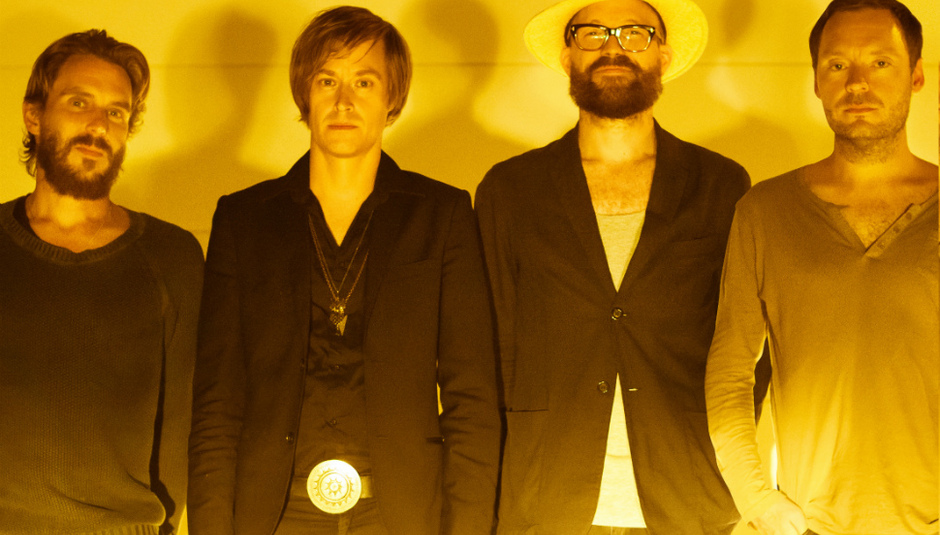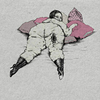Freedom is here. Refused have returned with a new studio album and, as expected, it’s split the band’s audience (many times the size it was when they released arguably the definitive hardcore record of the late 90s, The Shape of Punk to Come, in 1998) right down the middle. For some it’s a brave return, one that doesn’t make concessions to the band’s past whilst still retaining the surprising musical diversity that helped make their last album such a sleeper classic.
Crucially, it also articulates more bluntly and directly than ever the band’s radical political views. Seventeen years on from the band’s initial demise, the forces they stood against – global capitalism being the main culprit – are still here and they still don’t look like being challenged effectively any time soon. DiS spoke to vocalist and lyricist Dennis Lyxzén in an attempt to discover once and for all what makes Refused tick once more in 2015....
DiS: So the new album is finally ready for release. I really like it but I suspect a lot of people won’t, and it will probably be a very divisive record. How do you feel about that? Is it inevitable for a band releasing a new record after seventeen years?
Dennis Lyxzén: Yeah, probably… I see it as inevitable being the type of band that we are perhaps, rather than just being that way for any band that reforms after a long time. Every Refused record we ever made was different from the previous one, always, and of course with a seventeen year gap the differences in what we are doing will naturally be amplified, because it wasn’t just a two year gap or whatever. It’s interesting that you have people who say they love Refused because we’re so creative and outside the box, but then we get creative and go outside of the box and they get really upset. It’s kinda funny. There’s something flattering, though, about being a band that causes people to have such strong opinions. A lot of bands put out records and nobody really cares one way or the other.
Better that people don’t like it, in a sense, than are totally ambivalent about it…
Yeah, I think it’s interesting that so many people feel the need to say, to tell you and to tell us what we did wrong. There’s something about the culture that we live in now where that’s commonplace. But I’m pretty sure that it would have been the same if we had Twitter around the time of The Shape of Punk to Come.
So David, Kristofer and Magnus are the ones who started the ball rolling aren’t they? They were writing some songs together and you got involved later. Was there a certain moment when you decided that this could lead to a more permanent Refused reunion?
I don’t think there was a specific point, more a series of little points. They asked me. It came totally out of the blue and I had no intention to return to Refused. I was quite happy doing what I was doing, and what I’m still doing, with my other projects, so I wasn’t really prepared for it. Then we talked about it and they showed me songs and ideas, and David started talking about the direction – both musically and lyrically – and I was too curious. It started gnawing at me. I needed to know where it would take us. From when they asked me though, it was another three or four months before I really got on board, and this is during touring in 2012. There were other issues that were more pressing then, of course.
We wanted to keep it a secret both for our own sake – to stop there being outside pressure – and also because not telling anyone meant that we didn’t have to tell anyone if it failed. But when we dived into it, it began to feel so natural and fun and creative and exciting… and that’s what we wanted it to be.
’Elektra’ has the very prominent chorus line “Nothing has changed”. When I was thinking about that I couldn’t help but wonder about changes in the last seventeen years and particularly the internet. Has that changed things for you as a songwriter? I’m thinking particularly of a song like ‘Françafrique’, for example. People can now google that and discover all the politics behind it…
Not really, no. None of us in Refused are particularly internet savvy people, to be honest. We try to stay disconnected from that world where we can. It has definitely changed the way we listen to and consume music, and the way that people perceive the world around them. I’m not complaining about it, I’m just not interested in being part of it myself. But yeah you are right about ‘Françafrique’. Seventeen years ago people would have had to go to the library to find out what we were singing about.
With regard to the “Nothing has changed” line, however, the full line is, of course, “Down in the dirt, nothing has changed”. Everything has changed in the seventeen years that we have been away, but the impoverished and the poor are still down in the dirt. Yes, you have the internet and global economy and post-capitalism but there have been no solutions to these problems. Then again, it’s interesting to come out of the gates with a new song with that line because it does get people to question what exactly we mean…
Yeah, I mean you’ve pre-empted my next question slightly, because I was going to say that actually – in terms of the dominance of free market capitalism – things have actually got worse. You now have an opportunity to spread that message to more people than you ever could have done in 1998, so I was wondering if that was a significant factor behind making the new album?
A little bit, but ultimately the motivating fact will always be the need and the desire to create. Even though we are, and always have been, a band with a strong political agenda. However, it’s not an image. We weren’t young kids thinking, “Hey, let’s pretend to be Marxist revolutionaries… that will sell a lot of records!” It’s just the way we feel, and the way it’s always been for us, and if you’ve followed by trajectory through the last seventeen years, every record has still been political for me. That’s the kind of person that I am.
Of course, with Refused it’s a weird thing, because before we were writing for a much smaller crowd. We were a semi-big fish in a little pond, but with everything that’s happened since then we’ve become like this weird big rock band. Nobody really cared when The Shape of Punk to Come came out, and hopefully people will now. But it doesn’t change the fact that the need to write and create is always the dominating factor. We are just the type of people who will always take the lyrics and the ideas behind the songs very seriously, and attempt to make them as intelligent and multi-layered as it is possible for us to make them.
Is that kind of approach something that you think is somewhat worrying lacking in young bands today? There aren’t a huge number of overtly political young bands that spring to mind…
True, but this was also true in 1998 I think. In the 90s somewhere the landscape of political music changed. In the old days there were always mass movements connected to musical movements, whether it was the civil rights movement or Rock Against Racism or the miners’ strikes in the UK, for example. Nowadays that does not happen, because there is a lack of political mass movements for a band to rally behind. It’s also the case that most musicians play music because they want to play music, but for a band like us with a punk and hardcore background… it’s always been rebel music. The idea has always been to try and change something with the ideas that we have. I think music used to be way more radical in that sense. There are some radical ideas floating around in hip hop now, and in the underground there are always going to be radical bands, but as far as rock music goes – and that’s where we are, albeit with our punk and hardcore background – there are very few bands that talk about anything at all, let alone radical politics.
I think Refused have always had a lot of accessible songs, but this new album seems to go further in subverting “pop music” in some ways. Is that something you’d go along with?
Well, yes certainly. We’ve always been interested in that pop sensibility. Songs like ‘Liberation Frequency’ or ‘Summer Holidays’ are very hooky. A song like ‘Françafrique’ might actually be heavier, or harder, than those songs in fact. In the early days of Refused one of the things that you wanted as a band was for people to sing along. That’s part of the whole punk/hardcore agenda. The Umeå scene in the 90s grew because it was fun, and singing along to choruses was a part of that. That has always influenced us, whether it’s been in Refused or in The (International) Noise Conspiracy, INVSN or David’s solo stuff – which is almost Neil Young rock – so obviously that other stuff is something that is going to impact the way we write today. To use the heaviness and intensity of what we do with Refused in a way that can be combined with huge choruses that people can sing along to is pretty important and interesting for us… to get it to the point where you can almost, and I say almost, imagine hearing it on the radio. Especially with the ideas that we have, I mean with a song like ‘Françafrique’… if we could a song about European colonialism on the radio, it would be pretty spectacular actually.
That song has already attracted a lot of social media criticism…
Yeah, I think that one thing we have to almost compete with is our own legacy, and there was a sort of narrative to Refused that was pretty perfect. We were a hardcore band who put out our last record but nobody cared and then the cops closed down our last show… so if you discovered Refused after the time then the narrative is so perfect that you can almost own the band. So, people don’t want us to come back and sully their ideas of what we are supposed to be. People will tell us what Refused is, but WE are the band and WE are the ones that get to decide what it is that we want to do.
Then again, I think there are probably a lot of people who probably love The Shape of Punk to Come who were never interested in the lyrics or the ideas behind what we did, but they liked the style of music that we utilised on that album. If that’s what you’re interested in then maybe the juxtaposition present on songs like ‘Françafrique’ maybe isn’t going to be for you…
The colonialism theme on ‘Françafrique’ I assume is behind the album closer, ‘Useless Europeans’, as well to an extent…
Yeah, I mean there are a couple of main ideas there. That’s true of every song on the record. David and I often sit around saying “Let’s write about this” but layers build up because we’re smart people and we have a lot of ideas. With ‘Useless Europeans’ it is partially about how Europeans are always a bit disconnected from the rest of the world, and we have very little understanding of the world beyond Europe, but also that the “enlightened European” as an idea is about to die.
We are in a dying sort of world, and everything that happens around us is going to affect us. But the key thing in ‘Useless Europeans’ is that we are privileged people. If you’re a white male living in the North of Sweden then you are a privileged person, but then you look at yourself and you look at the world and you think about what exactly you have done with your privilege, and that’s what we want to look at in a song like ‘Useless Europeans’. We do nothing with our privileges. We complain about slow wi-fi while people in other parts of the world are dying trying to get into Europe from Syria or Africa because here is the promise of a better world. But then if you look inside Europe, you have Greece, and you have Italy, and Portugal, and Spain… economic disasters, poor people being even poorer and rich people being even richer. So it’s a multi-layered song about the condition of Europe I suppose. It’s also indicative of not wanting to write “fuck the USA” songs, because we are Europeans and we want to write songs from that perspective. That’s also why we wrote a song like ‘Françafrique’, for example, with its European perspective on colonialism.
Also, when you are young it’s easy to feel like you consider yourself the enlightened people, and you’re on hallowed ground. But then when you grow up you look around and you realise that you are a huge part of the problem, because it’s all about structures. You see your own position in the world, and so it’s important for us today to be able to talk about the fact that, no matter how much we critique global capitalism, we are also part of the problem, and that’s where a song like ‘Useless Europeans’ really comes into play.
I’m intrigued by how much growing up in Umeå may have impacted Refused, because there are quite a few heavy bands from that part of Sweden; for example, Meshuggah and Cult of Luna as well as yourselves. Did the isolation of being in the north have an impact on your approach?
Well I got into punk rock in 1987 and it took me six years to see a band that was not from our home town play. It’s better now because it’s quite cheap to fly here, and they’ve restructured the highways so it’s only seven hours to get here from Stockholm. So we were quite isolated and I think when you’re isolated then you have to create your own scene and your own sound. You can’t worry about the rest of the world because the rest of the world did not come here, especially in the pre-internet days. We were not part of the music culture in Sweden. That probably helped bands like us and Meshuggah to define our own sound, and this is true to this day. Three of us – me, Kris and Magnus – still live here. It’s grown to 120,000 people but it’s still a fairly small town, so from that point of view also I thin it definitely it still impacts the way we view the world.
To finish off, I was wondering how you feel about the band’s legacy now. When I think of the line “Rather be forgotten, than remembered for giving in” in ‘Summer Holidays vs. Routine’ it occurs to me that the band reuniting and releasing a new album is a new continuation of that philosophy…
For me, personally, when Refused broke up I had a new band. Two weeks later I was practicing with Noise Conspiracy. I released about twenty records and played about fifteen hundred shows in the interim between 1998 and now. So, for me, to come back and to play with Refused is just a continuation of what I’ve always done: playing music, and particularly playing live. That’s the closest I can come to the person I want to be in life. Also, if you know me and my history, sometimes I’ll play in front of twenty people and sometimes in front of twenty thousand people. There’s no difference, it’s just part of what I do. In some ways it’s particularly beneficial being with Refused because it means, for example, that if – like last year – play one hundred shows a year with INVSN we can afford to play more shows. I pay the wages of the other guys in the band, because I can afford to. But it’s part of the same thing, so Refused is a continuation of not giving in. It’s continuing to talk about these ideas alongside playing music. If nobody cares about this new record it will not change anything. I will continue to play music. I will never give in.
Freedom is out now.























